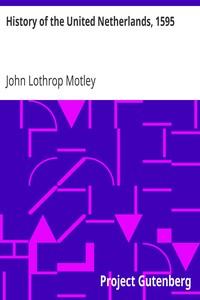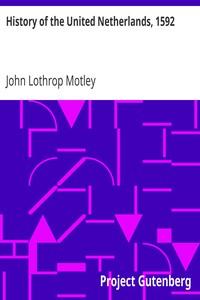|
|
Read this ebook for free! No credit card needed, absolutely nothing to pay.Words: 14434 in 4 pages
This is an ebook sharing website. You can read the uploaded ebooks for free here. No credit cards needed, nothing to pay. If you want to own a digital copy of the ebook, or want to read offline with your favorite ebook-reader, then you can choose to buy and download the ebook.

: History of the United Netherlands 1595 by Motley John Lothrop - Netherlands History Eighty Years' War 1568-1648@FreeBooksTue 06 Jun, 2023 Edition: 10 HISTORY OF THE UNITED NETHERLANDS From the Death of William the Silent to the Twelve Year's Truce--1609 History of the United Netherlands, 1595 The year 1595 Opened with a formal declaration of war by the King of France against the King of Spain. It would be difficult to say for exactly how many years the war now declared had already been waged, but it was a considerable advantage to the United Netherlands that the manifesto had been at last regularly issued. And the manifesto was certainly not deficient in bitterness. Not often in Christian history has a monarch been solemnly and officially accused by a brother sovereign of suborning assassins against his life. Bribery, stratagem, and murder, were, however, so entirely the commonplace machinery of Philip's administration as to make an allusion to the late attempt of Chastel appear quite natural in Henry's declaration of war. The king further stigmatized in energetic language the long succession of intrigues by which the monarch of Spain, as chief of the Holy League, had been making war upon him by means of his own subjects, for the last half dozcn years. Certainly there was hardly need of an elaborate statement of grievances. The deeds of Philip required no herald, unless Henry was prepared to abdicate his hardly-earned title to the throne of France. Nevertheless the politic Gascon subsequently regretted the fierce style in which he had fulminated his challenge. He was accustomed to observe that no state paper required so much careful pondering as a declaration of war, and that it was scarcely possible to draw up such a document without committing many errors in the phraseology. The man who never knew fear, despondency, nor resentment, was already instinctively acting on the principle that a king should deal with his enemy as if sure to become his friend, and with his friends as if they might easily change to foes. The answer to the declaration was delayed for two months. When the reply came it of course breathed nothing but the most benignant sentiments in regard to France, while it expressed regret that it was necessary to carry fire and sword through that country in order to avert the unutterable woe which the crimes of the heretic Prince of Bearne were bringing upon all mankind. It was a solace for Philip to call the legitimate king by the title borne by him when heir-presumptive, and to persist in denying to him that absolution which, as the whole world was aware, the Vicar of Christ was at that very moment in the most solemn manner about to bestow upon him. More devoted to the welfare of France than were the French themselves, he was determined that a foreign prince himself, his daughter, or one of his nephews--should supplant the descendant of St. Louis on the French throne. More catholic than the pope he could not permit the heretic, whom his Holiness was just washing whiter than snow, to intrude himself into the society of Christian sovereigns. The winter movements by Bouillon in Luxembourg, sustained by Philip Nassau campaigning with a meagre force on the French frontier, were not very brilliant. The Netherland regiments quartered at Yssoire, La Ferte, and in the neighbourhood accomplished very little, and their numbers were sadly thinned by dysentery. A sudden and successful stroke, too, by which that daring soldier Heraugiere, who had been the chief captor of Breda, obtained possession of the town, and castle of Huy, produced no permanent advantage. This place, belonging to the Bishop of Liege, with its stone bridge over the Meuse, was an advantageous position from which to aid the operations of Bouillon in Luxembourg. Heraugiere was, however, not sufficiently reinforced, and Huy was a month later recaptured by La Motte. The campaigning was languid during that winter in the United Netherlands, but the merry-making was energetic. The nuptials of Hohenlo with Mary, eldest daughter of William the Silent and own sister of the captive Philip William; of the Duke of Bouillon with Elizabeth, one of the daughters of the same illustrious prince by his third wife, Charlotte of Bourbon; and of Count Everard Solms, the famous general of the Zeeland troops, with Sabina, daughter of the unfortunate Lamoral Egmont, were celebrated with much pomp during the months of February and March. The States of Holland and of Zeeland made magnificent presents of diamonds to the brides; the Countess Hohenlo receiving besides a yearly income of three thousand florins for the lives of herself and her husband. In the midst of these merry marriage bells at the Hague a funeral knell was sounding in Brussels. On the 20th February, the governor-general of the obedient Netherlands, Archduke Ernest, breathed his last. His career had not been so illustrious as the promises of the Spanish king and the allegories of schoolmaster Houwaerts had led him to expect. He had not espoused the Infanta nor been crowned King of France. He had not blasted the rebellious Netherlands with Cyclopean thunderbolts, nor unbound the Belgic Andromeda from the rock of doom. His brief year of government had really been as dismal as, according to the announcement of his sycophants, it should have been amazing. He had accomplished nothing, and all that was left him was to die at the age of forty-two, over head and ears in debt, a disappointed, melancholy man. He was very indolent, enormously fat, very chaste, very expensive, fond of fine liveries and fine clothes, so solemn and stately as never to be known to laugh, but utterly without capacity either as a statesman or a soldier. He would have shone as a portly abbot ruling over peaceful friars, but he was not born to ride a revolutionary whirlwind, nor to evoke order out of chaos. Past and Present were contending with each other in fierce elemental strife within his domain. A world was in dying agony, another world was coming, full-armed, into existence within the hand-breadth of time and of space where he played his little part, but he dreamed not of it. He passed away like a shadow, and was soon forgotten. An effort was made, during the last illness of Ernest, to procure from him the appointment of the elector of Cologne as temporary successor to tho government, but Count Fuentes was on the spot and was a man of action. He produced a power in the French language from Philip, with a blank for the name. This had been intended for the case of Peter Ernest Mansfeld's possible death during his provisional administration, and Fuentes now claimed the right of inserting his own name. The dying Ernest consented, and upon his death Fuentes was declared governor-general until the king's further pleasure should be known. Free books android app tbrJar TBR JAR Read Free books online gutenberg More posts by @FreeBooks
: History of the United Netherlands 1592 by Motley John Lothrop - Netherlands History Eighty Years' War 1568-1648@FreeBooksTue 06 Jun, 2023

: History of the United Netherlands 1590-92 by Motley John Lothrop - Netherlands History Eighty Years' War 1568-1648@FreeBooksTue 06 Jun, 2023
|
Terms of Use Stock Market News! © gutenberg.org.in2025 All Rights reserved.






